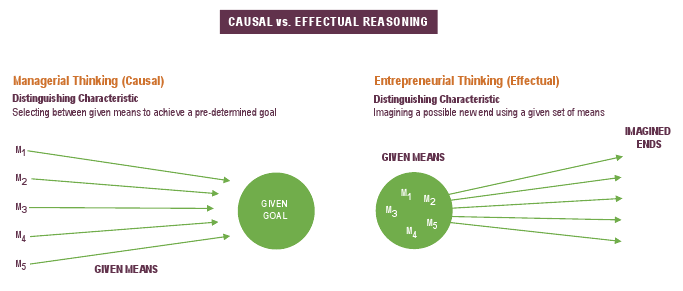 Entrepreneurship
Entrepreneurship
Effectuation: Entrepreneurship with a sense of purpose
I’ve been reading more about Effectuation lately in context of entrepreneurship and product development. I like its simple philosophy and framework. Aligns a lot with what we teach at NYU Stern.
Expert entrepreneurs believe that the future is shaped by people. They believe that if they can make the future happen, they don’t need to worry about predicting the future, determining perfect timing to start, or finding the optimal opportunity. Sarasvathy calls this “effectual logic” which sits opposed to “causal logic” taught to managers in more certain (or predictable) circumstances.
Effectuation vs. Causation
Aspiring entrepreneurs in MBA classrooms have long been taught the principles and tools of causal reasoning—the exact inverse of the effectual reasoning that drives entrepreneurial success. Using causal reasoning, one begins with a specific goal and a given set of means for reaching it. Using effectual reasoning, one starts with only a set of means; in the process of deploying them, goals gradually emerge.
The Principles
Bird in Hand Principle – Start with your means. Don’t wait for the perfect opportunity. Start taking action, based on what you have readily available: who you are, what you know, and who you know.
Affordable Loss Principle – Set affordable loss Evaluate opportunities based on whether the downside is acceptable, rather than on the attractiveness of the predicted upside.
Lemonade Principle – Leverage contingencies Embrace surprises that arise from uncertain situations, remaining flexible rather than tethered to existing goals.
Crazy-Quilt Principle – Form partnerships Form partnerships with people and organizations willing to make a real commitment to jointly creating the future—product, firm, market—with you. Don’t worry so much about competitive analysesand strategic planning.
Pilot in the Plane Principle. Control the controllable. The four specific principles above represent different ways entrepreneurs interact with the environment to shape the environment. Of course not everything can be shaped or controlled, but effectuation encourages you, as the pilot of your venture, to focus on those aspects of the environment which are, at least to a certain degree, within your control.
What is the effectual cycle?
Effectuation isn’t a static, one-time exercise. It is a logic and process that can be used as the firm develops in the “0-60mph” (early startup) phase of growth. Expert entrepreneurs follow the process to gain early customers and committed partners who then create new means and new goals as resources and viewpoints are added to the mix. Thus, instead of having a stated goal and finding means to reach it, expert entrepreneurs use the new means and new goals to drive the creation of the venture in ways they hadn’t expected, leveraging surprises as they present themselves. Effectuators use the process to lower the risk of the venture (by getting customers and income early, setting affordable loss, and spreading risk to others) and finding truly new and useful market opportunities by leveraging constraints and new information.
https://www.effectuation.org/?page_id=207

